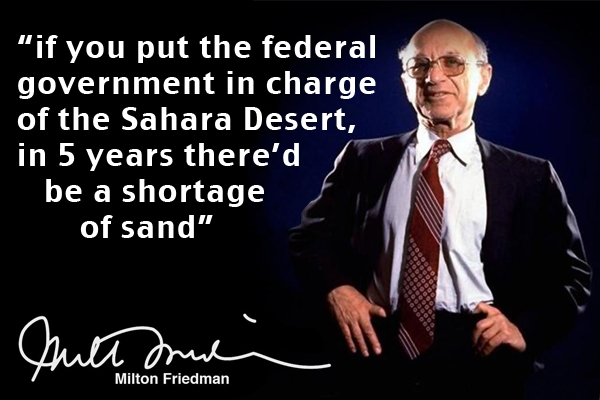Milton Friedman would have been 100 later this month, and there is likely to be much commemoration – much of it nostalgia for an era where the right had a clear idea about how to get out of the mess the left had left. I always believed that Friedman’s ability to articulate – his gift for aphorisms and jokes – was his greatest single talent. The arguments for the basics of human liberty are made all the time, but no one has quite made them with as much force and effectiveness as Friedman. His 1970s series Free to Choose remains, in my view, the most powerful TV documentary ever filmed – and the episode about school choice is horribly relevant to the mess we’re in now. But in this week’s magazine the historian Niall Ferguson looks at Friedman as a thinker and lists the many areas that he has been proven right. I had missed this, but Niall points to how Paul Krugman – the high priest of the neo-Keynesians – had used what he believed to be the stability of the pre-crash era to say that Friedman was wrong.
Krugman wrote a long double-edged piece in the New York Review of Books, which argued that monetarism had been comprehensively disproved by the fact that the Federal Reserve and other central banks had moved from targeting automatically the growth of broad money, to discretionary monetary policy of the sort Friedman had been against. Krugman argued that the great success the Federal Reserve had enjoyed with this discretionary monetary policy under Alan Greenspan clearly falsified Friedman’s theory. Subsequent events did not treat this article kindly, since if one wanted to point to a single cause of the great real estate bubble that ultimately triggered the financial crisis, one would point to the monetary policy of the Federal Reserve after discretionary policy replaced a monetary target…
What, then, of the claim that Milton Friedman was wrong about deregulation? Hasn’t the financial crisis dealt a lethal blow to his reputation as a pundit? ‘The question is,’ he famously wrote, ‘do corporate executives… have responsibilities in their business activities other than to make as much money for their stock holders as possible? My answer to that is no, they do not.’ This was from an article published in 1970 in, of all places, the New York Times Magazine. Grist to the mill, you might think, of those today who argue that the financial crisis was caused by precisely such attitudes.
Except that Friedman wrote something slightly different, which I deliberately abridged. The full quote is in fact: ‘The question is, do corporate executives, provided they stay within the law, have responsibilities in their business activities other than to make as much money for their stock holders as possible?’ That was, and remains, a rather important qualification, as the management of Barclays Bank know to their cost.
Milton Friedman understood not only the benefits of free markets but, like Adam Smith, he understood the failings of businessmen: the shortcomings of capitalists as a class.
The full article is in this week’s magazine – which may or may not be in the shops, depending on the state of Olympic censorship. The surest way to get The Spectator every week is to subscribe, which you can do from £1 a week by clicking here.
Some hat-tips: the Friedman image is from the Bastiat Institute’s Facebook page – plenty more where that came from. Niall Ferguson’s piece was based on his recent lecture to the Centre for Policy Studies, available here. And Ken Tindall has tweeted a link to the superlative Free to Choose series.







Comments